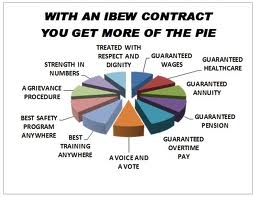Unions Improve The Lives of Their Members
Unions Are Their Members: Yes there are elected officers and hired staff to run the day-to-day business of the Union, but ultimately the actions of the Union are decided by collective voice of a majority of the members through a democratic process. "Unions are as active and as strong as the members want to be". Unions dramatically improve the lives of their members. On average, union members earn almost a third more than their non-union counterparts. And they enjoy correspondingly higher quality and rates of coverage for job-based benefits (pensions and health insurance). On these points there is not much disagreement. But business interests, right wing foundations, and Republican legislators interpret these as narrow and selfish gains—insisting that benefits claimed by union members come at the expense of non-union workers, economic growth and competitiveness, and (with regard to public sector workers) state budgets. None of this is sustained by the facts.
Aside from their economic contributions, unions provide broader benefits as well—a fact captured by the bumper sticker: “The Labor Movement: The Folks Who Brought you the Weekend.” Unions have played (and continue to play) a pivotal role both in securing basic labor rights and protections—ranging from wage and hour laws, to occupational health and safety, to “safety net” programs like social security. In turn, unions offer basic democratic representation at the workplace. Unions enable due process, and give workers a stronger voice in the broader community and in politics. As an intermediary institution, representing workers locally and nationally, the labor movement is an essential element of a thriving democracy. The "OBJECTS" or goals of the IBEW
Page Last Updated: Feb 10, 2022 (09:31:08)
|



